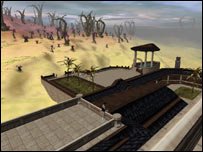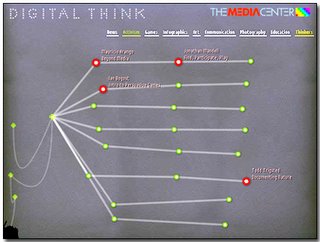Yesterday the parliament debated on the new plans for public broadcasting in het Netherlands (2008) A lot of the parties favoured a commercial free public broadcasting system. The responsible state secretary Medy van der Laan however is not in favour of a commercial free public broadcasting system. Now the revenues from commercials for Public Broadcasters are valued at 150 million Euros per year. However there is a decline already set in, caused by newcomer Talpa, generating a larger choice for the market for advertising on the commercial side. Talpa is aiming at a broad audience and already has achieved a market share of 8,5 % (last month). The policy will be set in from 2008. Concern is there about uncertainty the Public Broadcasters are facing now their budgets are declining AND it is not for clear if they will keep commercial revenues. At the other side internal inbalance is evolving as the board of directors wants to integrate programms on the channels, one aimed at young people, one at cultural content and one broad channel to compete with commercial ones, while the broadcasting societies aim at getting there profile more sharpened. Public Broadcasting needs to get out of their inertia and speed up to market developments. Focus should be on generating more value through high quality products in stead of on policy and structure.
Tuesday, November 22, 2005
Thursday, November 10, 2005
Utrecht students show crossmedia talent!
This afternoon Jorgen van der Sloot and I functioned as a jury to new media students in Utrecht. Nine weeks of hard work had to be pitched in 10 minutes:
http://crossmediaforum.web-log.nl/log/4060642
In every project there where pearls, like the personal assistant with an attitude in "get dressed", the promo of E-force and mixing of real life environments with virtual worlds, which was very strong and appealing. The love for film in Vertigo, the strong co-creation theme of shot! the creative use of sound in jazzture, the expirimental approach to theatre of Romeo and Julia, taking the user as starting point at Koken is cool and the fun in chicks and chicken!
Klein Dictee won the competition because it had a good worked out "story arch" in the concept, it made a clear start, there was attention to getting awareness to the concept. It had a concious aim at the user group (10-14yrs) and this was supported in the design of the concept en the choice for characters, like Ali B, who is very popular amongst 10-14 year old. It made creative use of IPTV and typing IN the contest and there was a strong build up of tension towards a final on television. (although the TV format needed to be worked out more) . The other winner; 'localiser' had a very clear-cut concept. It was clear right away what the concept was about and what was in it for the user!
I would like to conclude: Good work from all of you guys and girls. I am sure we will be seeing more of you in the near future. And very good work from Indira!!
Sell your virtual villa and make a real buckl!!

A gamer who spent £13,700 on an island that exists only in a computer game has recouped his investment, according to the game developers.
He made money by selling land to build virtual homes as well as taxing other gamers to hunt or mine on the island.
Project Entropia offers gamers the chance to buy and sell virtual items using real cash, a trend which is gaining popularity as the boundaries between the virtual and real worlds continue to blur.
Last month, another of Entropia's virtual properties - a virtual space station - sold at auction for £57,000. While the real housing market may be somewhat static, the one in the virtual world is booming, said the space station auction winner, gamer Jon Jacobs, AKA Neverdie.
He said the virtual real estate market was "on fire" as gamers increasingly realised that virtual worlds could start to compete with real worlds at an economic level.
Neverdie plans to use his space station to establish an in-game "night club" through which the entertainment industry can sell music and videos to gamers.
The Entropia economy works by allowing gamers to exchange real currency for PED (Project Entropia Dollars) and back again into real money.
Ten PEDs are the equivalent to one US dollar and gamers can earn cash by accumulating PEDs via the acquisition of goods, buildings and land.
Project Entropia was launched in 2003 and now has 300,000 registered accounts.
Digital Think

The mediacenter has come up with a new bundle of work from 'digital thinkers'. Here's what they say about it:
'This is the dawn of the connected epoch in human civilization. We are living, you and I, in the first seconds of a society reshaped by empowered individuals connected by digital networks, of lives shaped by unprecedented volumes of information and shifting notions of knowledge and trust. Institutions like media and governments are bending under the weight of change, of social and economic disruptions to the way people acquire and apply knowledge. New institutions and conventions are taking shape.
Storytellers are everywhere.
But we are a decade into the visual Web. Digital storytelling is NOT new, is NOT unexplored terrain in the new communications frontier.
Perhaps we are in the Morse Code stage or the silent film era (one camera, no lights); pioneers have already experimented with Flash, with different combinations and permutations of interactivity, with components that hint at a richer, more satisfactory digital future. Forms and storytelling techniques have historically taken time to evolve from the first experiments to stylistic and production conventions, and great artists have long sought to challenge such conventions. Even now, Hollywood production conventions are crumbling as digital editing and rendering create new processes and artistic possibilities for video-based media. Meanwhile, digital games have eclipsed movies as the bellwether of youth culture and experience.
What will news look like in this connected, digital society? Will it occupy its own space, or share personal bandwidth with gaming, blogging and the personal video remix?
DigitalThink is about the art of the possible, and a nod to thinkers around the globe who see in those possibilities a variety of pathways to more enriching forms of communication."
I could not agree more!
http://www.mediacenter.org/digitalthink